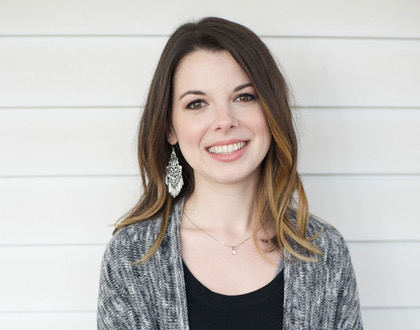Q. What are the latest trends in your industry?
A. As a foodie, I think my favorite trend right now is casual food, especially a Mexican buffet with fajitas and tacos. I mean, who doesn’t love queso? For dessert, we’re seeing more donut installations, pie bars, and bite-sized treats. Most cakes (wedding, birthday, or anniversary) are smaller with a statement design, such as tiers in geometric shapes, a colored glaze dripping down the side and marbled fondant.
For design, we’re seeing a lot of clients interested in a woodlands theme. Think muted colors like a dusty rose, ivory, and sage green paired with lots of greenery and other natural elements like moss, river rocks, and tree slices. I think a big reason why people are choosing to go this route is because it’s gender neutral and everyone can enjoy the aesthetic. And people always enjoy a good vintage piece. Whether it’s a farm table used as a dessert table or an old library card catalog used to display escort cards, these pieces will create more dimensions to the design.
Our clients are also moving away from the traditional photo booth with props, and opting for a Polaroid camera setup instead. Guests love it because they can take the photos with them, and our clients love it because it’s engaging. At the end of the event, we’ll gather the left over photos and save them for our client, who can turn them into a photo album. The photo album is a great keepsake, whether it’s a coffee table book for a newlywed couple or something to keep in a company break room for employees to flip through.
Q. What is the biggest mistake that you’ve seen people make in regards to event planning?
A. I think everyone should have a day-of coordinator for any event. And I’m not just saying that because I am an event coordinator. Trust me, I had someone coordinate my own wedding! I think it’s so important for our clients to be able to relax and enjoy everything that they’ve envisioned and worked hard to create. If you’re running around, making sure that everything is perfect, you will not have a good time. You should be able to mingle with your guests and enjoy yourself. Even if you’re DIYing your whole event, hire someone to handle the details and make sure that everything runs smoothly on that day. It’s worth every penny!
This is especially important at a fundraiser. Your guests are there because they believe in you and what you’re doing. Think of yourself as the brand ambassador and make yourself available to answer any questions that your guests may have. If they can’t find you to get more information about your cause, they are less likely to support it. We are there to make sure that everything goes off without a hitch and that you are able to reach your fundraising goal.
Q. What is your best piece of advice?
A. I think that people are naïve when it comes to the budget for any event. Many clients don’t know how much it costs to hire a good photographer, caterer, etc. so, they’ll spend money on little things and before they know it, they’re way over budget. My advice, choose your top three Items and spend the bulk of your money there. My top three are always food, music, and alcohol. I like invitations, but they aren’t the most important item to me. Now, if you’re a graphic designer or your company sells paper, the invitations are probably really important to you and that’s ok. Make invitations one of your top three. The important thing is to focus on what’s most important to you, and then build the rest of your budget from there.
Another great thing about working with an event planner is that we get discounts, which we pass onto our clients. A good event planner will save you several hundred dollars in various areas, covering some of their fee.
Additionally, if you’re just diving into the event world, be sure to cultivate relationships with other vendors early on. Find out how you can work together and offer discounts for your clients. Meet other like-minded vendors that specialize in your area and be sure to send them leads for dates that you have already booked. They’ll return the favor and help grow your business. The wedding and event industry is a small one, where everyone knows everyone else. Networking is so very important. Go to as many networking events as you can and start making those connections early on!
Q. What is one thing readers can do this week to improve?
A. If you’re an event planner or getting ready to plan an event, do some research. If I’m planning a company event or fundraiser, I always ask myself the following 5 questions:
What is this company’s daily mission?
What is their goal for this specific event?
What brand-specific elements can we incorporate into the event? (Awards, logo placement, etc.)
What is something fun and memorable that we can do during the event to increase brand awareness?
Is there something that guests can walk away with that will keep the brand or mission at the front of their mind?
Q. Anything else we should keep in mind?
A. No matter what type of event you’re planning, it’s important to remember the story your organization or client wants to tell. When guests walk into the event, they should be able to look around and know who or what this event is for. Everything should reflect the brand or personality. That’s what makes your event stand out from everyone else’s. And most importantly, make sure that your guests have fun!
















































